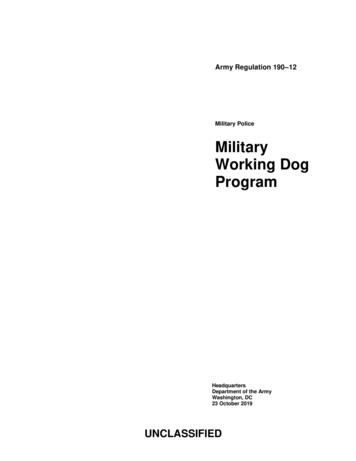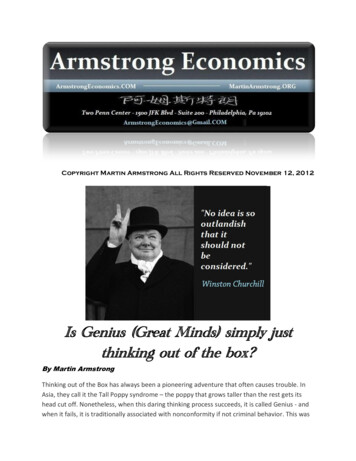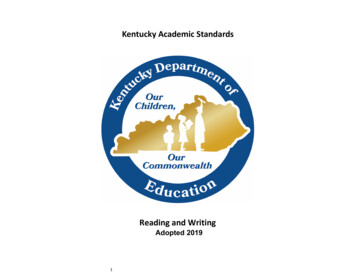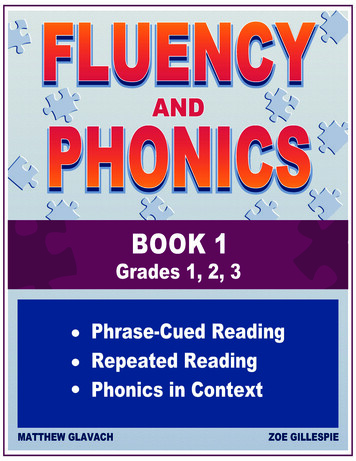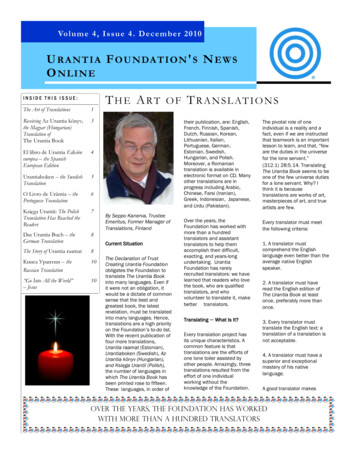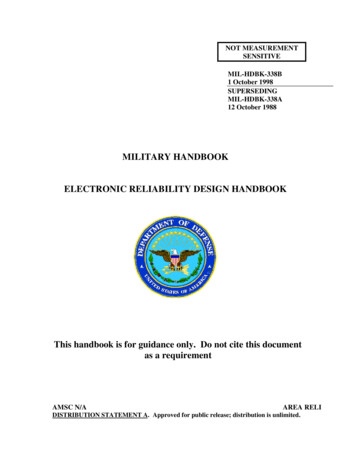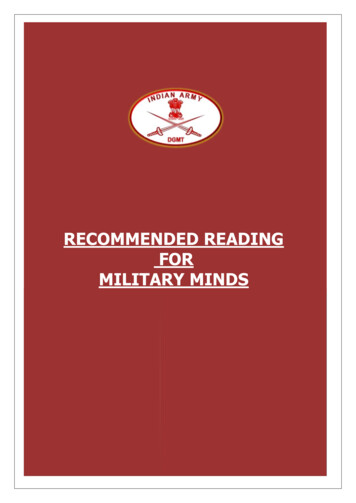
Transcription
RECOMMENDED READINGFORMILITARY MINDS1
This list aims at providing offrs with publications for readingrelevant to the study of the profession of arms. The list of bookshas been selected for reading upto offrs with 15 yrs of service &have been divided into two groups i.e. upto 7 yrs service & 7 to15 yrs service. Further in each gp the books have beensubdivided under fwg heads:(a)Theory/ Evolution of Warfare.(b)Mil History.(c)Leadership.(d)General Reading.The man who does not read good books has no advantage over the man who can't read.Mark Twain
YOUNG OFFICERS(UPTO SEVEN YEARS OF SERVICE)For the One who has conquered the mind, The mind is the best of friends;But for the One who has failed to do so, His very mind will be his greatest enemy.The Bhagvad Gita
1Theory/ Evolution of WarfareThe Profession of Arms – Gen Sir John Hackett.A wellillustrated book on the evolution of warfare from the ancient to the moderntimes, it covers the progression of weapons, technology and tactics in alucid yet simple style.1.Essentials of Military Knowledge – Maj Gen DK Palit.Coversthe study of warfare through the ages and examines its prime elements;strategy, operations, tactics and guerrilla warfare to conflict in the nuclearage.2.The Art of War – Sun Tzu.Written in China over two thousandyears ago, Sun Tzu‘s The Art of War provides the first know attempt toformulate a rational basis for planning and conduct of military operations.These essays contain principles, which are relevant even today.3.Defence of Duffers Drift – Ernst Swanton.An interesting andinstructive work on what Wavell has called, ―subaltern‖ tactics of sitingtrenches and common sense principles of defence.4.Infantry Attacks – F M Erwin Rommel. Rommel‘s classic on howmaneouvre can be successfully employed by the infantry in the mountainsbased on his personal experience during the First World War from 1914 to1917.5.The Next World War – John Adams. Explores the contours of theinformation revolution in all its forms from exploitation of media as anagent of political change in international relations to cyber warfare in avery readable format for the lay reader.6.Blue Helmets: The Strategy of UN Military Operations - Hillen,John.A comprehensive review of the military force and organizationaloperations of the United Nations since 1948, Blue Helmets addresses anumber of important questions about the UN's competency to handlecomplex future operations.7.City Fights: Selected Histories of Urban Combat from WorldWar II to Vietnam - Antal, John.An incomparable collection, City8.If you only read the books that everyone else is reading, you can only think what everyone elseis thinking.Haruki Murakami
2Fights re-creates the last century's most astonishing examples of urbanwarfare, stretching from Tai-Erh-Chuang in 1938 to Hue City in 1968.People's War, People's Army- Gen VO Nguyen Giap. In thisbook a successful communist general gives us a glimpse of the methodsof guerrilla war which were highly successful in Vietnam.9.Guerrilla Warfare: Irregular Warfare in the Twentieth Century –William Weir.This book traces the genesis of Guerrilla warfare andcritically examines a number of these conflicts, whether as sideshows ofthe World wars or as the main events in wars of revolution or liberation.10.The Pakistan Army – Stephen Cohen. A detailed analysis of thePakistani Army, its origins, structure, psychology, role of Islam and politicsby Stephen Cohen an acknowledged expert on the Pakistan Army.11.A History of the Modern Chinese Army – Xiaoping Li.In AHistory of the Modern Chinese Army, Xiaoping Li, a former member of thePeople's Liberation Army (PLA), provides a comprehensive examinationof the PLA from the Cold War to the beginning of the twenty-first centurythat highlights the military's central function in modern Chinese society.12.Military HistoryHistory of the Second World War – Liddell Hart. History of theSecond World War embodies the fruits of twenty years of research and alifetime of thinking on war. France‘s defeat in 1940, Hitler‘s failed invasionof Russia, and Japan‘s stunning victory at Pearl Harbor: the effectivenessof the Allies‘ strategic bombing of Germany; the questionable necessity ofdetonating atom bombs over Hiroshima and Nagasaki; and much moreare covered in incisive detail.13.The Indian Army After Independence – K C Praval.This is avaluable work on the history of the Indian Army from its break up postPartition to Operation Blue Star and covers all its operations over theyears in a fair amount of detail. Can be considered as a virtual almanac ofthe Indian Army over the ages.14.Slender Was the Thread – LP Sen.The unofficial history of the1947 J and K Operations, so to say providing a ring side view to thereader for the author was commander of 161 Infantry Brigade, the keyformation which undertook operations in the Valley during the period.15.Keep reading books, but remember that a book is only a book, and you should learn to think foryourself.Maxim Gorky“A great book should leave you with many experiences, and slightly exhausted at the end. You live several
3The Battle of Dograi – Brigadier Desmond E Hayde, MVC. Thebook covers a single battle during the Indo – Pak War 1965 and highlightswhat a highly motivated infantry battalion can achieve through sheer élanand leadership and also how its successes could not be exploited due tolack of flexibility in higher military leadership.16.A Ridge Too Far – War in the Kargil Heigts : 1999 – CaptAmarinder Singh.An account of the latest Indo-Pak conflict providinga novel view through a review of conduct of operations of the 10battalions.17.Infantry In India- Lt Gen V R Raghavan.Covers the evolutionof the Indian Infantry from the Middle Ages to the modern times includingits performance in the present era.18.The Official History of J and K Operations – 1947-48. B Prasad.The first Indo-Pak conflict occurred virtually on the call of independence in1947 and ended in 1948, with the standoff continuing to this day.19.Siachen : Conflict without End – Lt Gen V R Raghavan.The author with active experience of war fighting in the highest battlefieldon the Earth, the Siachen Glacier provides an overview of the nuances ofthe conflict from the practitioners as well as the armchair strategist‘s pointof view.20.Assignment Jaffna – SC Sardesh Pande.An account of OpPawan – our considerable endeavors on a military, diplomatic and politicalfront in Sri Lanka from 1987-1989.21.India’s China War – Neville Maxwell. An authoritative book onthe Sino-Indian War of 1962, which covers the political and military issuesin great detail; analyzed in depth including the Chinese perspective.22.The Lightning Campaign – Maj Gen DK Palit. During the earlierpart of the Bangladesh crisis, which was perhaps the most critical periodof its history, the Indian armed forces executed, within the brief period oftwelve days, the most decisive liberation campaign in military history,giving a nation of 75 million people its independence in one lightningstrike.23.A great book should leave you with many experiences, and slightly exhausted at the end. You liveseveral lives while reading.William Styron“A great book should leave you with many experiences, and slightly exhausted at the end. You live severallives while reading.”
4Pork Chop Hill – SLA Marshal.A nonfiction work about combatduring the Korean War. Book covers many significant topics like Chinesemilitary tactics; how U.S. and Korean troops worked together;communication on the battlefield; leadership and organization; the impactof terrain on battle; and types of weapons used.24.Patrol - Fred Majdalany.As indicated by the title, the centraltheme of the story is a night time infantry patrol.25.LeadershipPlatoon Leader – James Mc Donough.The American War inVietnam proved a test by fire for leaders particularly at the platoon andcompany level. This book based on the author‘s experiences in Vietnamas a platoon commander provides useful insights into grass rootscommand in the face of fire in an uncertain, insurgency environment withcolleagues operating on the fixed tenure syndrome.26.On Moral Courage - Compton Mackenzie. The renowned writerCompton Mackenzie sets out on the uneasy and difficult task to definemoral courage in this intellectually stimulating book.27.Follow Me II – Maj Gen Aubrey, “Red” Newman.A sequel tothe authors most successful and contemporary book Follow Me I, thebook comprises of reflections of an infantry officer on life in the army atvarious stages of command from the formative years to generalship.Gives very practical and timely insights on military conduct byprofessionals on and off the battlefield.28.Small Unit Leadership : A Commonsense Approach Dandridge M Malone.What does it take to get the job done? How doyou get the men in your unit to do what you say? To follow you into battleand shoot to kill? How do you build the confidence that spurs men on todo their job, to stand by their leader and each other? These are some ofthe questions that ―Small Unit Leadership‖ attempts to answer.29.Thinemaya of India – Humphrey Evans.Thimayyaslifecovered against the backdrop of events of his times. In this biographicalaccount the author puts Gen Thimayya at par with best of the militaryleaders of the world.30.The more that you read, the more things you will know. The more that you learn, the moreplaces you'll go.Seuss“A great book should leave you with many experiences, and slightly exhausted at the end. You live severallives while reading.”
5Field Marshal Sam Manekshaw : Soldiering with Dignity –Deepinder Singh.A tribute to India‘s best known modern militarycommanders, covers his life and times and his apogee, the victory inBangladesh in 1971 well covered with personal anecdotes.31.Rommel as a Military Commander – Ronald Lewin.The bookpresents an objective, vivid, and graphic picture of Rommel‘s operationsand methods of command. Discusses the mystique of Rommel, theDesert Fox, his battles and sway over the minds of his adversariesincluding Churchill.32.Slim as Military Commander – Geoffrey Evans.This biographyis a charming account of the leadership, clarity of thoughts,professionalism, easy demeanor and fantastic sense of humor of a manabsolutely dedicated to the task of soldiering with dignity. An inspiringstory of how merit will overcome the advantages of wealth and statuseven in a feudal setup as the Army of yesteryears. Slim, with no armorybut integrity, personality and intellect, rose to the pinnacles of hisprofession.33.The Officer as a Leader – S L A Marshall.Highlights the trialsand tribulations in following the honour code for officers covering theessential aspects of leadership from morale to mission and motivation.34.Demystifying Military Leadership – Lt Gen HB Kala, PVSM,AVSM, SC. The book analyses every relevant fact of military leadershipincluding aspects such as ‗Time Management‘, ‗Stress management‘ and‗The Art of Relaxation‘ which have not been given the attention theydeserve in the vast literature on the subject. The author suggests manypractical measures for the officers as they progress from the first to theapex ring of military leadership.35.Panzer Leader – Guderian.Published in 1952, PanzerLeader was an instant best seller and is now established as a classic. Itprovides an overview of the life and times of the father of modern tankwarfare and undoubtedly one of its greatest practitioners.36.It is a good rule after reading a new book, never to allow yourself another new one till you haveread an old one in between.C.S. Lewis
6Napoleon – Evil Ludwig. This book tells the story of Napoleon, aman of extra- ordinary qualities and brilliant military commander. It isabout his striking military campaigns, mighty wars, conquests and alsoreasons for his downfalls.37.Gen Reading38. Customs and Services of the Army – HR Roach.A primeon etiquettes and norms of social life in the Armed Forces, it highlights thestandards of accepted etiquettes, good manners and gentlemanlybehavior.39. Glimpses of World History – Jawaharlal Nehru. Providesabird's eye view of human history over the ages through the perspective ofa person who had the vision of evaluating it from the Indian perception.Covers all major political and military events of World history from theancient to the 20th Century.40. Serious Creativity - Edward De Bono.Military problems areusually multifaceted and without a 'right answer', especially in today'sworld of complex environments characterized by uncertainty. Soldiersneed to know how to think under pressure and with little or too muchinformation. Creative thinking can be taught, and this is a 'how-to' guide,full of exercises and activities to free up lateral thinking and sparkcreativity, including the well-known 'Six Thinking Hats'.41. Battles that Changed History : An Encyclopedia of WorldConflict.All of these conflicts—and hundreds more—played a crucialrole in defining the direction of history and the evolution of human society.This text provides readers with detailed descriptions of the battlefieldactions that have played the greatest parts in shaping military history andhuman existence.Either write something worth reading or do something worth writing.Benjamin Franklin
YOUNG OFFICERS(7 TO 15 YEARS OF SERVICE)
7Theory / Evolution of WarfareStrategy, The Indirect Approach – BH Liddell Hart.A detailedanalysis of success in warfare achieved through use of the indirectapproach covering the period from ancient and medieval wars to theSecond World War.38.On War – Von Clausewitz.‗On War‘ is the most significantattempt in Western history to understand war, both its internal dynamicsand as an instrument of policy. Since the work‘s first appearance in 1832,it has been read throughout the world, and has stimulated generations ofsoldiers, statesmen, and intellectuals.39.The Art of War – Jomini. This work is in the same vein asClausewitz‘s On War and some critics say superior to it in some aspects.It covers the salient aspects of strategy, grand tactics (operational art) andbattles, logistics and combined arms. A complementary companion to ‗OnWar‘.40.Principles of War by Carl von Clausewitz. "Not simply thegreatest but the only truly great book on war," declared historian BernardBrodie on Principles of War. Written two centuries ago by a Prussianmilitary thinker, this is the most frequently cited, the most controversial,and in many ways, the most modern book on warfare.41.The Art of Manoeouvre – Robert Leonard.Covers thedevelopment of the theory of manoeuvre warfare and its culmination intothe air land battle. Leonard exposes the folly of the view of war as anattritional phenomenon, measuring success in body counts and tons ofexplosives spent through a strategy of high-tech attrition rather thaneffective maneouvre.42.Arthashastra – Kautilya.This political classic of ancient Indiacovers the organization of the state and function of its various constituentsincluding perceptive observations on defence and war, planningcampaigns and covert operations.43.If one cannot enjoy reading a book over and over again, there is no use in reading it at all.Oscar Wilde
8Nuclear Doctrine for India – Raja Menon. Acomprehensivecoverage and analysis of nuclear strategy for India covering developmentof nuclear weapons, locus of the atomic bomb in international relations tothe Indo-Pak and Sino-India nuclear calculus, command and control andnuclear strategy.44.The Art of War in World History, Chaliand, Gerard.Theprogression of the art of war from ritualized wars of the ancient andmedieval times to modern warfare including the atomic age has beencovered in great detail and with accuracy.45.The Making of Strategy - Rulers, States and War - WilliamsonMurray, Alvin Bernstein and MacGregor Knox. This book's objectiveis to provide the reader with an understanding of the varied factors thatinfluence the formulation and outcome of national strategies. It offers atour de force of historical examples, ranging from the origins of strategyunder the Athenians to the intricacies of the nuclear age. It iscomprehensive, inclusive and written by leading scholars.46.Roots of Strategy - Phillips, T.R.A.Concise summary of thewritings of Sun Tzu, Vegetius, de Saxe, Frederick and Napoleon, Roots ofStrategy is a useful addition to the understanding of military thought andits evolution prior to the twentieth century.47.Prepare or Perish – General KV Krishna Rao.Provides ageographical and historical perspective survey of Indian security from thePartition to the Sub Continental Wars, counter insurgency and discussesIndia's vital interests, strategy and NBC warfare.48.Amphibious Warfare: Strategy and Tactics. The Theory andPractice of Amphibious Operations in the 20 Century - Ian Spellerand Christopher Tuck. Despite its illustrated coffee table format, thisprimer by two British defence academics analyses the step by steppreparation and execution of amphibious operations and has valuablechapters on logistics and equipment.49.Air Power and Joint Operations – Air Commodore Jasjit Singh.Highlights the need for a greater understanding of air power and jointoperations in the Indian Military.This significant work by Air CommodoreJasjit Singh enhances our understanding of employment of air power andits role in joint operations in the Indian Sub Continent.50.I think of life as a good book. The further you get into it, the more it begins to make sense.Harold Kushner
9The Next World War – John Adams. Explores the contours ofthe information revolution in all its forms from exploitation of media as anagent of political change in international relations to cyber warfare in avery readable format for the lay reader.51.Allvin & Heidi Toffler – War and Anti War. AlvinandHeidiToffler are futurists who's line of work on the future of power and warfareprovides the backdrop to this influential book which has identified thatcontours of the information and knowledge age and how it will affect theway we conduct war and also antiwar or peace.52.The 33 Strategies of War - Robert Greene. Brilliant illustrations ofthe strategies of war—and the subtle social game of everyday life.Spanning world civilizations, synthesizing dozens of political,philosophical, and religious texts and thousands of years of violentconflict, The 33 Strategies of War is a comprehensive guide to the subtlesocial game of everyday life informed by the most ingenious and effectivemilitary principles in war.53.Military HistoryThe Bear Trap – Brig Mohammad Yousaf and Major Mark Atkin.Highlights the role and functioning of the ubiquitous Pakistani intelligenceagency the Inter Services Intelligence or ISI and its role in the Afghan waragainst Soviet invasion by an officer who was tasked to co-ordinate theseoperation. Denotes functioning of a modern intelligence organizationsupported by the state.54.North African Campaing : 1940-43- Liddell Hart. NorthAfricaoffered the geographical space for practicing the theory of maneouvrewarfare. Military leaders as Wavell and Rommel provided the daring andtactical innovation to win battles which would seem unwinnable undernormal circumstances. A study of this campaign thus assumessignificance in more ways than one.55.A book is a device to ignite the imagination.Alan Bennett
10Barbarossa – Alan Clark. Covers the full swathe of theoperations on the Eastern Front during the Second World War fromHitler‘s drive to Moscow to the Red Army‘s march on Berlin with all theups and downs, the tactics and strategy involved on both sides. Anexcellent account of what some say the ultimate campaign in militaryhistory.56.Defeat Into Victory – Fd Marshall William Slim. Presentsthehistory of victory against Japan in Burma by Field-Marshal ViscountWilliam Slim who led the shattered British forces from Burma to India inone of the lesser-known but more nightmarish retreats of the war, and theultimate liberation of India and Burma from the Japanese Army.57.No Victor No Vanquished – The Yom Kippur War – Edgar O’Balance.The Arab – Israeli wars provide an useful insight to studentsof the military art on the nuances of modern conventional warfare wagedin an environment of intense hostility. As the title suggests most of thesewars have ended without any tangible gains to both sides. A survey of theArab Israeli conflict by one of the renowned historians of our times.58.War in the Gulf : Lessons for the Third World – Brig VK Nair,VSM (Retd).The Gulf War 1991 demonstrated the variation in wagingconventional conflict between the modern, Western Armies and ThirdWorld Armies as that of Iraq. Analysis of the lessons of this War from theThird World perspective is essential to highlight applicability of the samein our context provided by the author.59.History of First World War – Liddell Hart. The First World Warsome military analysis feel is anachronistic in the information warfare ageof today. However it is the matrix of modern warfare, where coalitions andnot nations fight wars at a global scale. Liddell Hart is ideally suited toprovide a perspective on the First World War with its background, majorcampaigns, strategy, tactics and lessons learnt.60.History of the Second World War 1939 – 45 Maj Gen J F CFuller. Covers the strategies and tactics of the Allies and Axis powersduring the Second World War restricted to the land campaign in Europe,Africa, Pacific and Burma.61.A book is the most effective weapon against intolerance and ignorance.Lyndon Johnson
11War Dispatches – Lt Gen Harbaksh Singh.A detailed reviewof 1965 operations including the main battles, air, logistics, Pakistanitactical concepts and lessons learnt from the man who should know it all,the GOC in C Western Command during the War.62.The Bear Went over the Mountain: Soviet Combat Tactics inAfghanistan - Grau, Lester W. To capture the lessons their tacticalleaders learned in Afghanistan and to explain the change in tactics thatfollowed, the Frunze Military Academy in Russia compiled this book fortheir command and general staff combat arms officers. It provides anintimate look at the brutal business of Counter insurgency operations.63.The Past as Prologue: The Importance of History to the MilitaryProfession - Williamson Murray and Richard Sinnreich. A collectionof essays from writers important in the field of military studies, thisanthology explores the significance of history to the military profession.64.The Official History of J&K Operations 1947-48 - B Prasad. Thefirst Indo-Pak conflict occurred virtually on the call of independence in1947 and ended in 1948, with the standoff continuing to this day. Thisbook by the official historians provides a detailed survey of the conflict.65.Himalyan Blunder-Brig JP Dalvi.In this book Brigadier Dalvigives his version of the events that led to India's debacle in theHimalayas. Dalvi is firmly of the view that China does not have any rightover Tibet and that the McMahon line ought to be India's north Westernfrontier. Maxwell on the other hand is very sympathetic to China's claimsover Tibet and does not believe the McMahon line, a British invention,ought to be the boundary between India and Tibet.66.LeadershipPanzer Leader – Guderain.Published in 1952, PanzerLeader was an instant best seller and is now established as a classic. Itprovides an overview of the life and time of the father of modern tankwarfare and undoubtedly one of its greatest practitioners.67.No matter how busy you may think you are, you must find time for reading, or surrenderyourself to self-chosen ignorance.Confucius
12Acts Of War: The Behavior Of Men In Battle - Richard Holmes.This wide-ranging, exhaustively researched book is a compelling attemptto grasp the very nature of war. It takes us through the soldier'sexperience in its entirety – from the humiliation of basic training and theintense comradeship of army life, to the terror, isolation and exhaustion ofbattle.68.The Last Hundred Yards: The NCO's Contribution to Warfare Poole, H.J.Evidence of success in limiting rules on subordinate unitscan be found in many examples throughout history. The German NCOs ofWorld War I were trained in making tactical decisions. They were decidinghow to engage the enemy, and at a time and place of their choosing.Within The Last Hundred Yards, author H.J. Poole argues that the smallunit leader needs to adapt to situations as they develop, and that therigidity of rules (and training by the same) is counter to the manoeuvrewarfare concept of winning at low-cost.69.Demystifying Military Leadership – Lt Gen HB Kala, PVSM,AVSM,SC. The book analyses every relevant facet of military leadershipincluding aspects such as 'Time management', 'Stress management ' and'The Art of Relaxation' which have not been given the attention they71.deserve in the vast literature on the subject. The author suggestsmany practical measures for the officers as they progress from the first tothe apex ring of military leadership.70.Men Against Fire: The Problem of Battle Command in FutureWar -Marshall, S.L.A.First published in 1947, S.L.A. Marshall's MenAgainst Fire argues that in spite of the proliferation of weapons systemsthat allow targets to be destroyed from great distances, future wars willstill fundamentally revolve around the infantry.72.In the Line of Duty : A Solider Remembers – Lt Gen HarbakshSingh.This is a book about a soldier who had the courage of hisconvictions and was not afraid to use his judgment and face theconsequences. He not only set a standard for himself to perform to thebest of his ability but inspired others to do the same.73.There is no excuse for a literate person to be lecs than three thousand years old in his mind.Liddel Hart
13The Challenge of Command: Reading for Military Excellence Roger H Nye. An insightful combat-arms officer, Colonel Nye hasproduced a one-of-a-kind tool for the professional officer who intends tomaster his profession. A handbook for mentors as well as junior officers,this work guides the reader through the major aspects of command:developing a professional vision and being a tactician, warrior, moralarbiter, strategist, and mentor.74.Tao of Leadership - John Heider. The book provides Simplestand clearest advice on how to be a very best kind of leader : be faithful,trust the process, pay attention and inspire others to become their ownleaders.75.General ReadingDiscovery of India – Jawaharlal Nehru.This book takes usthrough the remarkably rich history of the Indian civilization and covers thepolitical as well as the military issues with incisive comments by aperceptive thinker that Nehru was.76.The Clash of Civilization and the Remaking of World Order –Samuel P Huntington.A popular, seminal but controversial reviewof the post cold war world which argues that new religious, social andeconomic tensions will be a major source of future conflict.77.Emotional Intelligence – Daniel Goleman. Goldman‘s refreshingresearch that emotional quotient is as important if not a more importanttrait for leaders of tomorrow provides very good tips for development ofemotional stability in leader.78.Soldier and the State – Samuel P Huntington.Incisiveandremarkably relevant. Huntington delves into the role of the military inshaping and protecting a society and the significance of civil militaryrelationship based on a study of the same in the USA, Germany andJapan in the pre World War II era.79.The best advice I ever got was that knowledge is power and to keep reading.David Bailey
14The Indian Army After Independence – KC Praval.This is avaluable work onthe history of the Indian Army from its break up postpartition to Operation Blue Star and covers all its operations over theyears in a fair amount of detail. Can be considered as a virtual almanac ofthe Indian Army over the ages.80.The Seven Habits of Highly Effective Pepole – Stephen RCovey. Stephen R. Covey presents a holistic, integrated, principlecentered approach for solving personal and professional problems withpenetrating insights and pointed anecdotes, Covey reveals a step-by-steppathway for living with fairness, integrity, honesty, and human dignity.81.Management in the Armed Forces – John Downey.The basicbook on management in the Armed Forces, provides a basic insight intothe significance and employment of the science of management in theArmed Forces.82.
LIST OF MIL HISTORY BOOKSSer No Name of bookINDIAN MIL HISTORYIndo Pak War 1947-481.Official History of Ops in J&K (1947-48)2.OP Rescue3.Slender was the Thread4.Without Baggage5.Thunder Over Kashmir6.The Pak Army 1947-48: Pakistan OfficialReport on Kashmir OpsSino India Confict 19627.War in High Himalayas8.India‘s China War9.Himalayan Blunder10.1962 and The Mcmahon Line SagaAuthor11.Xuecheng LivThe Sind-Indian Border Dispute and SinoIndian RelationsIndo Pak War 196512History of Indo-Pak War-196513.Missed Opportunities : Indo Pak War196514.Prepare or Perish15.Twenty Two Fateful Days : Pakistan CutTo Size16.War Despatches17.The Battle Of Dograi & BataporeIndo Pak War 197118.India Pakistan War 197119.The Lightening Campaign20.Western Front21.Surrender at Dacca22.The Liberation of Bangladesh23.Leadership:Field Marshal SamManekshaw24.Betrayal of East PakistanKargil War 199925.Kargil 1999 Pak‘s fourth War for Kashmir26.Kargil- The Impregnable Conquered27.The Table Turned28.Kargil- Blood on the Snow29.From Surprise to Reckoning-the KargilReview Committee Report30.A Ridge Too Far : War in The KargilHeights 1999Dr S N Prasad & Dr Dharam PalLt Gen S K SinhaLt Gen LP SenLt Gen EA VasMaurice CohenMaj Gen Shaukat RizaMaj Gen DK PalitNeville MaxwellBrig JP DalviClaude ArpiBK ChakravartyMaj Gen LS LehiLt Gen KV Krishna RaoMankekar DRLt Gen Harbux SinghBrig Desmond E Hayde, MVCMaj Gen Kuldip Singh BajwaMaj Gen D K PalitLt Gen KP ChandethLt Gen JFR JacobMaj Gen Sukhwant SinghMaj Gen (Retd) S D 'Shubi' SoodGen AAK NiaziAir Commodore Jasjit SinghLt Gen Y M BammiMaj Gen Ashok Krishna &PR ChariMaj Gen
The Pakistan Army - Stephen Cohen. A detailed analysis of the Pakistani Army, its origins, structure, psychology, role of Islam and politics by Stephen Cohen an acknowledged expert on the Pakistan Army. 12. A History of the Modern Chinese Army - Xiaoping Li. In A History of the Modern Chinese Army, Xiaoping Li, a former member of the
